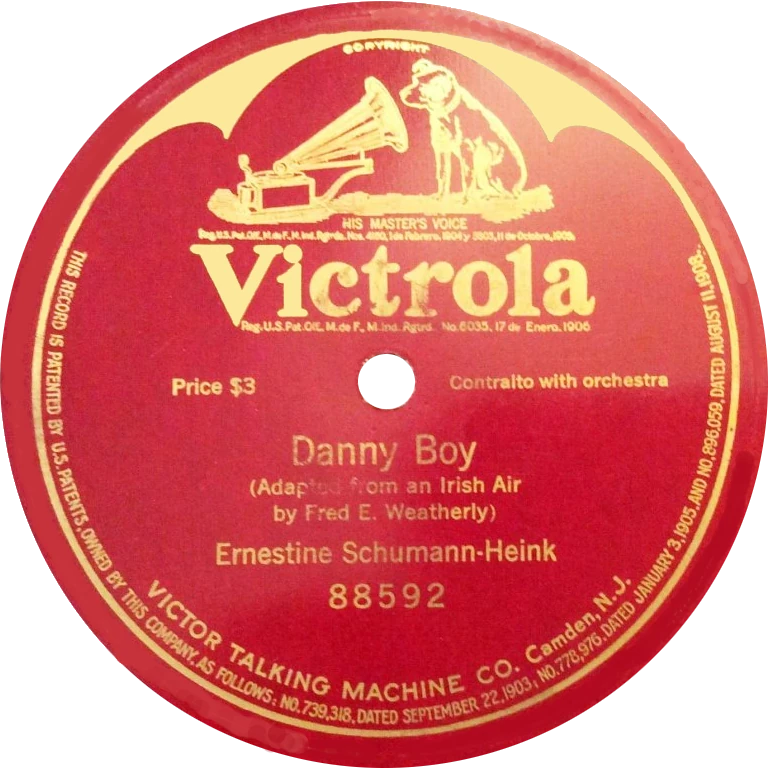Eily Dear [Danny Boy]
trad • weatherly

Have you ever heard about Fred E. Weatherly? Not? Well, these days not many have, except for people with special interest for poetry and lyrics, but in his own time he was renowned both as a barrister and wordsmith.
Frederic(k) Edward Weatherly, KC (1848 – 1929) was a lawyer (in fact he didn't start this career until approaching forty) with a stong passion for verses and rhymes. And he was prolyfic: he wrote more than 3000 poems; half of them became song lyrics. One of these became a song which melody most everybody in all parts of the world have heard; recorded so many times that a normal database will crash trying to store it. The story about it is a long and winding road; I cut it short:
In 1910 he wrote a poem without any idea of a melody. Three years later his sister-in-law Margaret heard an untitled folk tune in the mine districts of Colorado, USA. She caught it, wrote it down and sent a copy of the notes to Weatherly. He liked it, plowed through his pile of unused poems, found one special and rewrote it a little bit. The tune was later recognized as Londonderry Air and the poem he picked up was the three year old one he'd named Danny Boy!
Londonderry Air is an irish folk tune coming out of nowhere, and the name was given by coincidence. The air may be traced back to Aislean an Oigfear {The Young Man’s Dream} from the 17th century, but nobody knows who's behind this one, either.
Weatherly left the song with opera singer Elsie Griffin, who spread the song wider. First recording was made in 1918 by Ernestine Schumann-Heink. Step by step the popularity grew, and for some hundred years now it's been the unofficial anthem of Ireland - though written by a man who never planted his feet on the green islands.
Deep down the subway of internet I found an obsolete website containing THIS background stuff. WARNING! Holy Cat, this is tough shit. The page loads heavily. The content is ... academical. Have your white pills ready.
The song is apparently sung by a woman; from the words. A male vocal may be a father's adieu to a leaving son. If a song - to be sold as "sheet music" - could be bisexual, it would cover a double market. To be sure; Weatherly wrote a special male version "Eily Dear", hardly ever mentioned. I leave you both, with his original words, I believe from his own biography "Piano and Gown" (1926).
EILY DEAR
oh Eily dear : the pipes, the pipes are calling
from glen to glen and down the mountain side
the summer's gone and all the roses falling
It's I : it's I must go and you must bide
but I'll come back when summer's in the meadow
or when the valley's hushed and white with snow
and you'll be here in sunshine or in shadow
oh Eily dear : oh Eily dear : I love you so
someday may be : when all the flow'rs are dying
and I am dead : as dead I well may be
ye'll come and find the place where I am lying
and kneel and say an Ave there for me
and I shall hear though soft you tread above me
and all my grave will warmer, sweeter be
for you will bend and tell me that you love me
and I shall sleep in peace until you come to me
DANNY BOY
oh Danny boy : the pipes, the pipes are calling
from glen to glen and down the mountain side
the summer's gone and all the roses falling
it's you : it's you must go and I must bide
but come ye back when summer's in the meadow
or when the valley's hushed and white with snow,
it's I'll be here in sunshine or in shadow:
oh Danny boy, oh Danny boy : I love you so
but when ye come and all the flowers are dying
if I am dead : as dead I well may be
ye'll come and find the place where I am lying
and kneel and say an Avè there for me
and I shall hear though soft you tread above me
and all my grave will warmer, sweeter be
for you will bend and tell me that you love me
and I shall sleep in peace until you come to me
For the following CHORD section, fullscreen/horizontal mobile is recommended.
Chords in brackets may be omitted.
The body of this melody is of the solid kind, and it MAY stand simplification down to the basic chords G/C/D - I've heard it recorded by famous singers that way - but then it vanishes into triviality; losing the "air". Please give this one a try.
...D7 G G7 C ...Am7 oh Eily dear the pipes the pipes are calling D6 D7 G Bm Em A7 ...D7 from glen to glen and down the mountain side G G7 C ...Am7 the summer's gone and all the roses falling D7 Em A7 D7 G ...D7sus4 ... D7 it's I it's I must go and you must bide C Am G ...C+2...D7sus4 but I'll come back when summer's in the meadow D7 Em E7 A7 ...D7 or when the valley's hushed and white with snow G C+2 Bm Em ... C and you'll be here in sunshine or in shadow D7 Bm E7 A7 D7 G oh Eily dear oh Eily dear I love you so

G

G7

C

C+2

D

D6

D7

D7sus4

A7

Am

Am7

E7

Em

Bm





